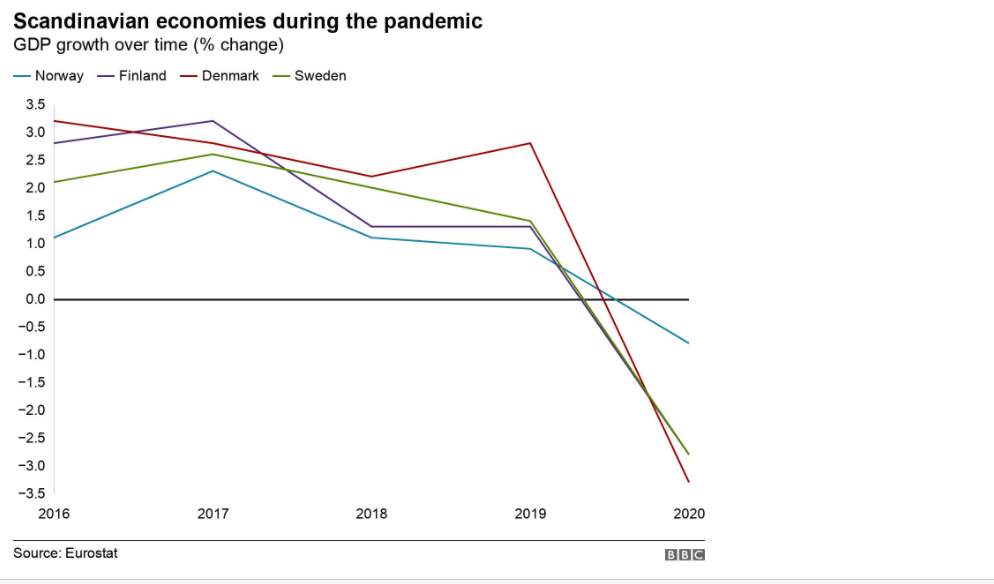ეს ნახეთ, დაღუპულების რაოდენობაზეც არის, ლოკდაუნებზეც შვედეთზეც და ა. შ.
https://www.bbc.co.uk/news/55949640Covid lockdown: Seven enduring claims fact-checked
Claim: "Here we are a year later - the world shut down for a 99.97% survival rate"
Verdict: This figure and similar figures being widely shared, are incorrect.
One recent estimate shows that overall, on average, about 99.3% of people who catch coronavirus survive it, according to statistics analysed by University of Cambridge.
That might not seem like a big difference, but it means that about 70 in 10,000 people are expected to die - not three in 10,000.
The death rate is much higher for older and more vulnerable people.
And many people across all age groups suffer serious long-term effects from the virus.
Long Covid: 'I can't walk 10m without a rest'
About 10% of people still have symptoms 12 weeks or more after their positive test, according to an Office for National Statistics (ONS) study.
(The symptoms are wide-ranging, including cough, loss of smell, fatigue and sore throat. The study is still a work in progress. And it's worth noting that some people may have dropped out, and that those with symptoms are more likely to report them.)
Claim: Suicides increased "200%" during lockdown
Verdict: The only reliable recent data available on suicides in England - from the University of Manchester - has found that rates have not risen during lockdown.
Stay-at-home orders and the economic impact of the pandemic have undoubtedly taken a toll on people's mental health.
However, shared posts saying suicides have gone up by 200% during the pandemic are false.
Claim: Every winter hundreds a day die from respiratory diseases..."why are we locked down?"
Verdict: Flu, a serious respiratory virus can be deadly - but there are vaccines and treatments available. Only very recently have vaccines for Covid-19 started to be rolled out, and only now are more effective treatments available.
The long-term effects of Covid can also be much more severe for many people and it's more infectious than flu.
Covid is also deadlier, says Prof Andrew Pekosz, faculty director at Johns Hopkins University in the United States.
"Covid-19 has a higher severe disease and mortality rate than influenza in all age groups, except perhaps children under the age of 12."
The risk of serious illness and death from coronavirus is significantly higher for older age groups.
Claim: "Covid-19 death rates have been falsely inflated"
Verdict: More than 125,000 Covid deaths have been recorded in the UK so far.
There are different ways of recording these deaths, but all broadly agree on the scale of the crisis.
About 90% of the deaths where Covid appeared on the death certificate had the virus as the underlying cause attributed by a doctor, according to the ONS. The ONS total roughly matches up with Public Health England's count, which looks at anyone who died within 28 days after a positive test, as well as the number of excess deaths, which is measured against a five-year average.
Almost all of these have been attributed to coronavirus, according to the UK's three national statistics agencies.
Claim: "No-lockdown Sweden fared better than the UK"
Verdict: It's true that Sweden has had a lower Covid death rate than the UK, but it has fared significantly worse than its neighbours, all of which had tighter initial lockdown restrictions.
Many people opposed to Covid restrictions point to the example of Sweden, a country which at the beginning of the pandemic avoided introducing a compulsory lockdown, and instead issued voluntary distancing advice.
However, Sweden is a very different country to the UK and has characteristics that may have helped it during the pandemic.
It has a lower population density, and a high proportion of people live alone. The capital, Stockholm, is also less of an international transit hub than London.
When compared to other Scandinavian countries with similar population profiles, Sweden has fared much worse and recorded a significantly higher number of deaths than its neighbours, all of which have had tougher restrictions during much of the pandemic.
მიმაგრებული სურათი (გადიდებისთვის დაუწკაპუნეთ სურათზე)



